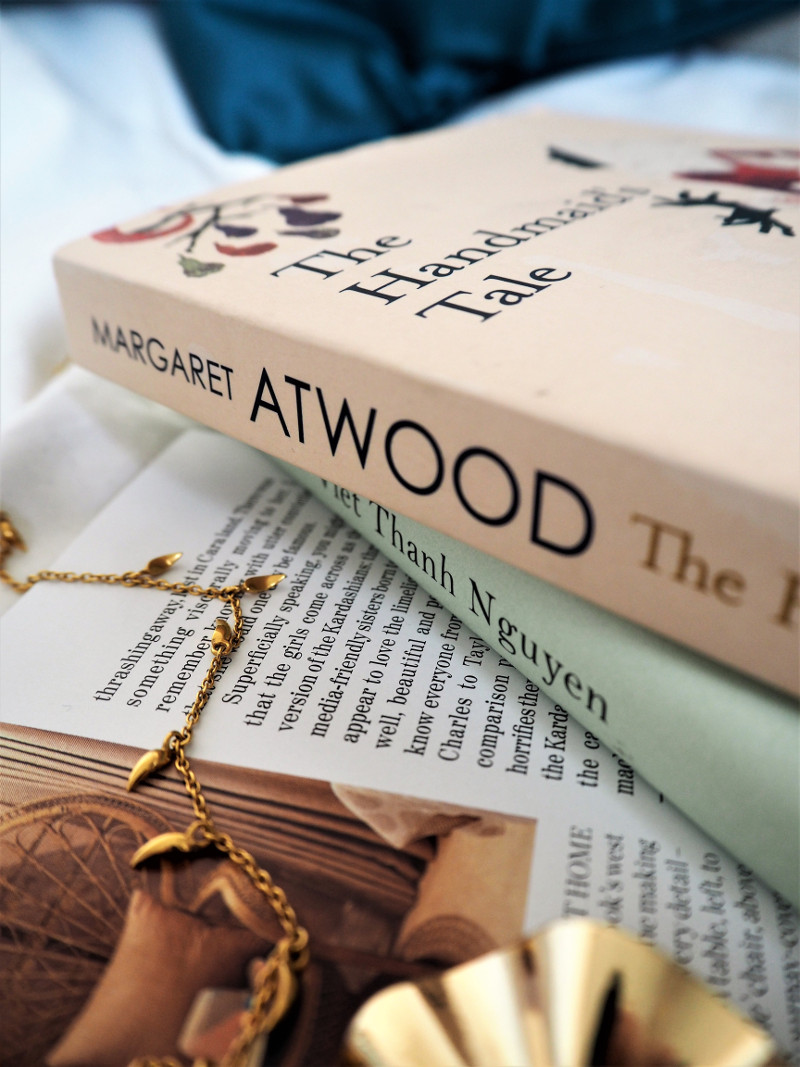One of the only good things about commuting every day to London is that it's practically forced me to pick up books again after a long drought of opting for Netflix over literature (as much as I preach that the latter is hugely more rewarding, I just couldn't seem to switch off The OA last month..). Making use of those, often painful, hours has meant I've got through almost a book a week, and feel a lot more productive as a result. Last week, I started a novel that's been on my radar recently.. for those not familiar with The Handmaid's Tale, it was bought to my attention both by articles of it's popularity recently (see here and here), as well as it's recommendation on Lucy Williams' FMN Bookclub and noting the TV adaptation soon to hit our screens via Hulu (watch trailer here). Written in 1985, Atwood's speculative take on a dystopian society at the collapse of the government in America forms this modern classic.
I have long since been struck by the first page of a novel as I was with this book and I couldn't put it down for the five days it took me to get through. It's not a book for the faint-hearted or a holiday easy-read, being subtly quite horrifying in content (quite a juxtaposition, there) and a downright chilling tale of what could be, given the right circumstances, but nevertheless, a must-read.
In short, the book is told from the perspecive of Offred (literally, Of-Fred; the name of her Commander), who's role in society is now a handmaid within a totalitarian state that has replaced what once was modern America. A handmaid is to provide their designated household with a child within two years or face being publicly hanged, or banished to the colonies to die of radiation poisoning. Acting as an instrument for reproduction, freedom is entirely restricted, with 'Eyes' around the cities watching their every move. Offred's past intercepts her narrative and she re-tells how normal her life once was, very similar to the world we're in now, and what lead up to this present. When society is overturned, women (particularly those unmarried or in a second marriage) were first to be targeted and sent to the Red Centre and the partriachial ideology is drilled into them - brutally and mercilessly.
It's provoking depiction of a society that's poignant now especially, given the time we are living in, noting the political situation in America and it's potential repercussions. This parallel is undoubtedly a result of the novels resurgence in popularity right now (likewise with 1984... some call The Handmaid's Tale the 'feminist' version). Dystopian fiction, or totaliarian fiction, has a longstanding place in our interests when it comes to entertainment, given the popularity of The Hunger Games and it's predecessors in sci-fi genres etc., but this novel has a lingering sense of gravitas when it comes to the art imitating life notion, which is tough to shake off when you're reading it.
I'd recommend giving it a read for so many reasons; the literature student in me could write a dozen essays on this book and not feel as though I'd scratched the surface. It is simply a fascinating read, it will get your thoughts racing and resonate with you. The 'Historical Notes' at the end of the novel is an authentic touch, and reminds me of those happily-ever-after fairy tales where order is restored and it was all seemingly just a bad dream; perhaps a sense of hope that things can re-build themselves. Interestingly enough, it is still a case of men discussing the importance of men, just within an academic sphere.. another echo of patriachy still residing in the text.
Book recommendations always welcome!




No comments
Post a Comment